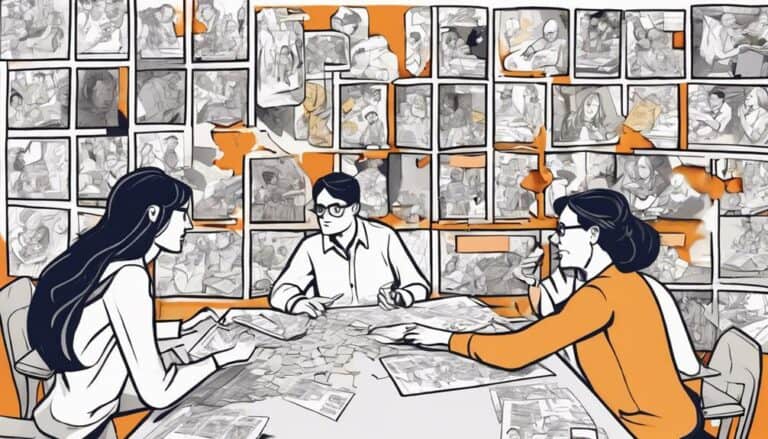To boost critical thinking in problem-solving and decision making, actively reflect, question assumptions, and seek evidence. Embrace intellectual humility and consider diverse viewpoints. Use data analysis tools, logical reasoning, and hypothesis testing. Foster open-mindedness through exploring alternatives and challenging biases. Analyze information, evaluate evidence, and synthesize logical arguments. Prioritize diverse perspectives, weigh options objectively, and anticipate risks. These strategies enhance your analytical approach, promote adaptability, and refine decision-making skills for success.
Key Takeaways
- Actively engage in reflection to enhance critical thinking skills.
- Utilize data analysis tools for analytical approach in problem-solving.
- Cultivate a dynamic environment for diverse perspectives to promote open-mindedness.
- Analyze information actively and evaluate evidence for decision making.
- Prioritize diverse perspectives and anticipate risks for strategic decision making.
Cultivating Critical Thinking Skills
To nurture critical thinking skills effectively, you must actively engage in reflection, question assumptions, seek evidence, and embrace intellectual humility. Critical thinking enables you to analyze information thoroughly, consider alternative viewpoints, and develop insightful questions. By questioning assumptions, you can foster a deep understanding of complex issues and make informed decisions in problem-solving scenarios.
Developing critical thinking skills is vital for enhancing your ability to navigate through challenges with a rational and logical approach. It empowers you to assess situations from multiple perspectives, allowing for a more thorough evaluation of the available information. By honing these skills, you sharpen your capacity to decipher complexities, identify patterns, and derive meaningful insights that can guide your problem-solving efforts effectively.
In essence, cultivating critical thinking skills equips you with the tools necessary to tackle intricate problems with confidence and precision. It lays the foundation for a systematic and methodical approach to decision-making, ensuring that your choices are well-informed and backed by sound reasoning. Embrace the journey of developing these skills, as they're invaluable assets in both professional and personal spheres.
Enhancing Analytical Approach
Enhancing your analytical approach involves utilizing data analysis tools and frameworks to optimize problem-solving and decision-making processes efficiently. By breaking down complex problems into manageable parts, you can adopt a more systematic and logical reasoning methodology. This approach strengthens your critical thinking skills, enabling you to approach problem-solving with a structured mindset.
Emphasizing hypothesis testing and experimentation further cultivates an analytical mindset in decision-making, allowing you to test different scenarios rigorously. Additionally, focusing on data interpretation and statistical reasoning plays an essential role in enhancing analytical thinking for problem-solving.
Promoting Open-Mindedness
Promoting open-mindedness in problem-solving and decision-making cultivates a dynamic environment for considering diverse perspectives and exploring alternative solutions. Embracing open-mindedness fosters a pivotal willingness to challenge assumptions, leading to more creative and effective decision-making. This approach helps in overcoming cognitive biases and encourages a deeper analysis of information in critical thinking processes.
By being open-minded, individuals can adapt to new information, adjust strategies, and refine problem-solving approaches for better outcomes. Cultivating open-mindedness enhances flexibility, adaptability, and resilience in facing complex challenges. It allows for a more holistic view of situations, making it easier to identify innovative solutions that may have been overlooked otherwise.
Encouraging open-mindedness is significant for developing a mindset that's receptive to change and open to exploring unconventional ideas. By challenging assumptions and staying open to diverse perspectives, individuals can navigate problem-solving with agility and insight, leading to more successful outcomes.
Applying Critical Thinking Techniques
Engage in critical thinking techniques by actively analyzing information, evaluating evidence, and synthesizing logical arguments to enhance problem-solving and decision-making processes. Utilize problem-solving skills by breaking down complex issues into manageable parts and exploring multiple perspectives to gain a thorough understanding. Employ logical reasoning and evidence-based arguments to support your decision-making, fostering a culture of open-mindedness to explore alternative solutions effectively. Practice reflection and self-assessment to continuously improve your critical thinking abilities, thereby enhancing your overall decision-making capabilities. By incorporating these strategies into your approach, you can guarantee that you are making well-thought-out decisions based on sound reasoning and evidence.
| Critical Thinking Techniques | Benefits |
|---|---|
| Utilizing logical reasoning and evidence-based arguments | Supports effective decision-making |
| Engaging in active problem-solving | Breaks down complex issues for better understanding |
| Fostering open-mindedness towards alternative solutions | Encourages innovative problem-solving |
| Practicing reflection and self-assessment | Promotes continuous improvement in decision-making skills |
Fostering Strategic Decision Making
To foster strategic decision making effectively, prioritize active exploration of diverse perspectives to enhance critical thinking in problem-solving processes. Analyzing information objectively and considering various options are essential steps in improving strategic decision making.
By evaluating evidence, weighing pros and cons, and anticipating risks, you can enhance your critical thinking skills in decision making. Techniques such as brainstorming, seeking alternative viewpoints, and actively exploring diverse perspectives can help you make more informed and effective decisions.
Creating an environment that values curiosity, intellectual humility, and open-mindedness is vital for promoting strategic decision making. Encourage the practice of reflection to gain insights and refine your decision-making process.
Conclusion
To sum up, fostering critical thinking in problem-solving and decision making is essential for success in today's intricate world. Research indicates that individuals who possess strong critical thinking skills are more likely to make well-informed decisions and find effective solutions to challenging problems.
By developing these skills, enhancing analytical approaches, promoting open-mindedness, and applying critical thinking techniques, individuals can become better equipped to tackle any issue that comes their way.
Remember, critical thinking is a valuable asset in maneuvering the complexities of decision making.

